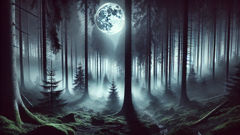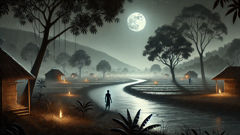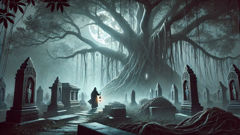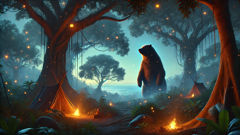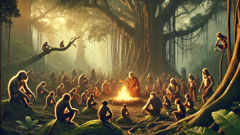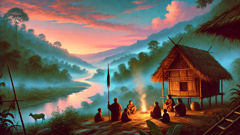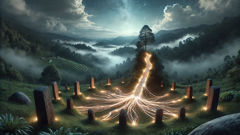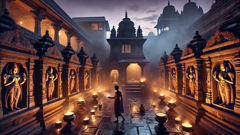Introduction
When dusk settles over the ancient pines of the Black Forest, an uneasy hush falls across the land. The shadows grow tall and tangled, twining between mossy trunks and tangled roots. Locals say the trees themselves seem to lean closer, their branches whispering secrets too old to understand. For centuries, villagers in the heart of southwestern Germany have spoken in hushed tones about the Erlking—a sinister, elfin figure who haunts these woods. Children are warned not to stray from the path, and grown men hurry home before nightfall, their eyes flicking nervously to the gloom beneath the trees. Some claim to have glimpsed him: a tall, spectral figure cloaked in mist, his eyes glowing like cold embers, his voice carrying a melody as sweet as it is deadly. Others swear they have heard laughter drifting through the fog, or seen pale, dancing lights luring wanderers deeper into the forest’s embrace. The legend of the Erlking is more than a ghost story; it’s a living warning woven into the very fabric of Black Forest life. Parents invoke his name to frighten unruly children into obedience. Poets and scholars debate his origins—whether he is a demon, a forgotten god, or simply the spirit of the forest itself. But all agree that the Erlking is a force not to be trifled with, a creature who preys upon the lost and the innocent. This tale, set in the shadowed heart of 19th-century Germany, follows the journey of Jakob and his son Emil as they cross the Black Forest on a storm-tossed night. What begins as a desperate ride to safety becomes a struggle against fear, illusion, and an ancient evil that is as real as the roots beneath their feet. To understand the power of the Erlking is to confront the darkness that dwells in every forest—and every heart.
I. Shadows Beneath the Pines
Jakob Heller guided his weary horse along the narrow woodland path, his son Emil clutched tightly against his side. The boy was shivering, face pressed into his father’s coat as the wind whipped leaves into ghostly spirals. The day had ended with a heavy, coppery sunset, and now night crept over the hills like spilled ink. Every hoofbeat sounded too loud, echoing between ancient trunks and tangled roots. The woods seemed alive—not with the usual chitter of night creatures, but with a listening silence that pressed in from all sides.
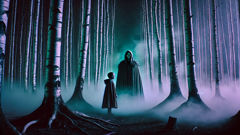
Jakob had never liked this stretch of forest. He remembered stories from his own childhood—of children snatched from cradles, of travelers who vanished beneath a pale moon, of the Erlkönig who could not be seen unless he wished it. Even now, as a grown man with a sick child in his arms, he felt those tales breathing on his neck. Emil had developed a fever that morning, his small face flushed and his breath shallow. The nearest healer was in the next village, but that meant crossing miles of darkening forest. Jakob had left before sundown, desperate to save his son, but the journey was slower than he’d hoped. The path twisted endlessly, roots clawing at his boots and fog creeping in thick, suffocating waves.
Halfway through the woods, Emil began to mutter in his sleep. At first, Jakob thought it was the fever—nonsense words, snatches of lullabies. Then he heard it: another voice, soft and coaxing, threading between the branches. It was neither male nor female, neither old nor young. The words were strange, but the tone was sweet—soothing, almost hypnotic. Jakob’s skin prickled. He pressed Emil closer and urged the horse on. Behind him, the voice grew louder, singing a melody that tangled with the wind. “Vater, siehst du den Erlkönig?” Emil mumbled suddenly, eyes flickering open. “Er winkt mir im Dunkeln…” Jakob swallowed hard, heart pounding. “Just a dream,” he whispered. “Hold on, Emil. We’re nearly there.”
The forest thickened. Moonlight barely filtered through the dense canopy, and the air felt heavy with unseen eyes. The horse snorted nervously, shying at shadows. Once, Jakob glimpsed something pale moving between the trunks—a flicker of white, too swift and silent for any animal. He tried to convince himself it was only mist, but his own breath caught in his throat. Emil’s feverish murmurs grew more urgent. “He calls me, Vater. He says he has flowers and games… Can I go?”
Jakob’s grip tightened. He remembered his mother’s warnings: never speak to what you hear in the woods after dark. Never follow the dancing lights. He tried to block out the song, but it wound itself around his mind, filling him with longing and dread. Suddenly, the horse stopped dead, refusing to go forward. Jakob dismounted and lifted Emil into his arms, stumbling on foot through tangled undergrowth. The path was gone now, lost in the darkness. The singing drew closer—beckoning, promising warmth and rest. Emil’s head lolled on Jakob’s shoulder, his small hand reaching toward something only he could see.
A chill swept over Jakob. He turned, but the way behind had vanished, swallowed by mist. The forest was no longer a place of trees and roots; it was a labyrinth of shadow and echo. Somewhere ahead, a figure appeared—a tall, thin man with hair like white gold and eyes that glimmered green. He stood among the birches, arms outstretched, his robe rippling like smoke. “Come, child,” the Erlking whispered. “Let me soothe your fever. Let me carry you where pain cannot follow.”
Jakob staggered backward, clutching Emil to his chest. He shouted for help, but the sound was swallowed by fog. The Erlking advanced, his smile both gentle and terrifying. With each step, the world seemed to tilt—the forest blurring into a realm of dreams and shadows. Jakob felt his will slipping, his legs growing heavy. In that moment, he remembered his wife’s voice: “Love is stronger than fear.” Gritting his teeth, Jakob pressed Emil’s face into his shoulder and began to run, blind and desperate, through the endless night.
II. The Erlking’s Court
Branches whipped at Jakob’s arms and legs as he crashed through the undergrowth. Each step sent pain lancing up his calves, but he didn’t dare stop. Behind him, the Erlking’s song rose and fell, wrapping the forest in a silvery web. Emil’s breath came in ragged gasps, his body limp in Jakob’s grasp. “Flowers, Vater… he has such beautiful flowers…” the boy whimpered. Jakob stumbled on a root and nearly fell, catching himself against a mossy trunk. The forest pulsed with an unnatural light—violet and blue, like moonbeams filtered through stained glass. Shadows twisted into unfamiliar shapes, and the trees themselves seemed to watch with ancient, indifferent eyes.
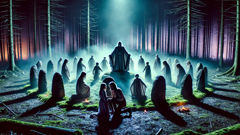
Somewhere deeper in the woods, laughter rang out—childlike and cruel. It echoed in the gloom, promising joy and terror in equal measure. Jakob glimpsed movement at the edge of his vision: pale children with garlands in their hair, skipping in a circle beneath a giant oak. Their faces were too perfect, their eyes too bright. They beckoned to Emil, who struggled weakly in his father’s arms. “Let me go, Vater! Please—I want to dance!” Jakob’s heart broke at the desperation in his son’s voice. He clamped his hand over Emil’s eyes and forced himself forward.
Suddenly, the forest parted and Jakob found himself in a wide clearing lit by an unnatural glow. The ground was carpeted in violet flowers, their scent thick and cloying. At the center of the clearing stood the Erlking’s court—a ring of ancient stones draped in silvery moss. The Erlking himself stood atop the largest stone, his cloak billowing like smoke. Around him danced his courtiers: ghostly children, twisted elves with wicked smiles, and shadowy beasts that moved like ink in water. “Welcome, Jakob Heller,” the Erlking intoned, his voice both beautiful and hollow. “You have brought me a gift.”
Jakob staggered to a halt. He could feel the pull of the Erlking’s gaze, as irresistible as the undertow of a river. The courtiers began to circle him, their laughter rising in a cacophony of joy and menace. The Erlking stretched out his hand. “Give him to me, and you may go free. Your journey will be forgotten—the pain, the fear, the fever. Let me take your burden.” Jakob shook his head, tears blurring his vision. “He is my son,” he choked out. “He is not yours.” The Erlking’s smile faded. His eyes darkened to pitch. “All children of the forest belong to me,” he said softly. “Those who wander after dark, those who listen to my song—so it has always been.”
Jakob dropped to his knees, clutching Emil to his chest. “Please,” he begged, “he’s sick—he needs help. Let us go.” The Erlking stepped down from his stone, his form shifting—sometimes a man, sometimes a woman, sometimes a shadow with no face at all. “You love him,” he mused, as if tasting the word. “That is rare here.” The court grew silent. Even the wind seemed to pause. “Love is powerful,” the Erlking continued, “but so is longing. Listen to my song.”
A melody rose in the clearing, achingly sweet. Jakob felt his memories slipping—his village, his wife’s laughter, the warmth of home. Only Emil remained real, heavy and burning in his arms. The Erlking reached out again, fingers elongated and shimmering with frost. “Give him to me, and you will both be free from pain.” Jakob looked down at Emil’s face, flushed and feverish. For a moment, he wavered. The flowers in the clearing began to sway, releasing clouds of silver dust. The air thickened, and the world tilted on its axis.
But then Jakob remembered: the stories his mother told, the warnings passed from generation to generation. The Erlking thrived on weakness—on surrender. Gathering every scrap of strength, Jakob pressed his lips to Emil’s forehead and whispered, “I will not let you go.” The words rang out in the clearing, sharper than any blade. The court recoiled, hissing. The Erlking’s eyes flared with anger. “Foolish mortal,” he spat. “You cannot defy me.”
With a howl, the Erlking lunged forward. Jakob stumbled backward, clutching Emil as the ground split beneath them. A blast of icy wind swept through the clearing, and the world dissolved into darkness.
III. Between Worlds
Jakob opened his eyes to find himself in a place that was both forest and not-forest—a world suspended between dream and nightmare. The trees here were taller, their trunks twisted into impossible shapes. The ground shimmered with frost, even though it was midsummer. Emil lay beside him, breathing shallowly, his face pale as milk. All around them, shadows shifted—some shaped like animals, some like men, some with no form at all. The Erlking stood at the edge of this liminal space, watching with eyes that pierced the soul.
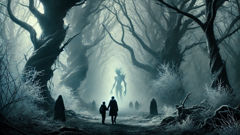
“You see now,” he murmured, “my realm is not bound by your world’s laws. Here, pain and hope are but threads in a larger tapestry.” Jakob struggled to stand, but his legs were heavy as stone. He could feel the Erlking’s presence pressing on his mind, urging him to give in. Memories flickered before his eyes: his wedding day, Emil’s first steps, laughter by the hearth. Each one was tinged with sorrow—the fear of loss, the ache of longing. The Erlking’s song wove through these memories, promising release from all suffering.
“Why do you torment us?” Jakob demanded, voice cracking. “What do you want?” The Erlking’s face softened, just for a moment. “I am neither evil nor good,” he replied. “I am hunger. I am longing. I am the shadow at the heart of every story.” He knelt beside Emil, brushing a lock of hair from the boy’s forehead. Emil stirred, eyes fluttering open. “Will you come with me?” the Erlking asked gently. “It will not hurt. You will be warm and safe.”
Emil looked at his father, confusion clouding his gaze. Jakob reached for his son’s hand, ignoring the numbness creeping up his arms. “Don’t listen,” he pleaded. “Stay with me, Emil.” The Erlking’s form shifted—now a young woman, now an old man, now a wisp of fog. His voice filled the space, echoing from every tree and stone. “Let go,” he urged. “Let the darkness take you.”
Jakob fought to hold on—to memory, to love, to hope. The air grew thick, every breath an effort. Shadows pressed closer, whispering promises of peace. Emil began to slip away, his hand growing cold in Jakob’s grasp. Desperation surged within Jakob. He remembered a prayer his mother once taught him—a fragment of Latin, a plea for protection. He began to recite it, words tumbling from his lips in a broken whisper.
The Erlking recoiled as if struck. The shadows faltered. For an instant, Jakob saw through the illusion: the court was nothing but wind and leaves, the Erlking nothing but a shadow born from fear. He clung to Emil, repeating the prayer over and over. Light began to seep into the world—first a faint glimmer, then a flood of golden warmth. The Erlking screamed, a sound that shook the very air.
“Love is not enough,” he hissed. “You cannot keep him from me forever.” But Jakob held on, refusing to yield. The light grew brighter, driving back the shadows. The forest began to reassemble itself—trees snapping back into place, roots untangling beneath his feet. Jakob stumbled forward, cradling Emil as the world spun around him.
Suddenly, he was running again—through real woods this time, beneath a pale dawn sky. The Erlking’s voice faded, replaced by birdsong and the rustle of wind in the leaves. Jakob collapsed at the edge of the forest, sobbing with relief as Emil stirred in his arms.
Conclusion
When the villagers found Jakob and Emil at sunrise, they were sprawled at the edge of the Black Forest—muddy, exhausted, but alive. Emil’s fever broke with the first rays of sunlight, his cheeks regaining color as if by magic. Jakob could barely speak of what he had seen; his memories felt like fragments of a nightmare, fading as quickly as the morning mist. But he knew the truth: the Erlking was real, and so was the danger lurking beneath those ancient pines. Word spread through the village of Jakob’s ordeal, and parents grew even more cautious at dusk. Children were taught to avoid the deep woods, and the legend of the Erlking took on new urgency. Some scoffed at Jakob’s story; others believed every word. Yet all agreed that love—unyielding and fierce—had saved a child from the shadow’s grasp. The Black Forest remains as it always was: beautiful and deadly, a place where stories walk beside you in the night. And though the Erlking’s song still haunts the darkness for those who listen too closely, Jakob’s defiance stands as a reminder that even the oldest evil can be challenged by courage and hope.

